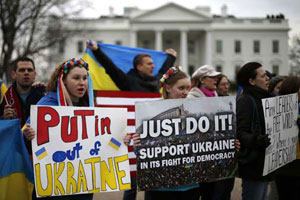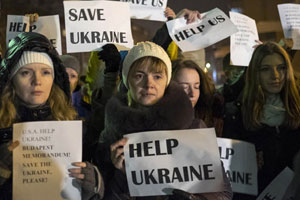MOSCOW -- Russia on Monday refuted NATO's allegations that Moscow was conducting
"We categorically disagree with the statement of the NATO Council on March 2 which accused the Russian Federation of military escalation in Crimea in breach of international law," the Russian Foreign Ministry said in a statement.
Military escalation would not stabilize the situation in Ukraine, but encourage forces that had planned to take advantage of the crisis for achieving their "irresponsible political goals," the statement said.
The ministry stressed that the sole source of the current threats to Ukraine's sovereignty and territorial integrity was the internal political crisis in the country.
The Ukrainian crisis, which originated from protests against President Viktor Yanukovych's decision last November to put on hold an association agreement with the European Union to get Russian aid, took an abrupt turn in the past two weeks following bloody clashes between protesters and police. Yanukovych was ousted by the parliament and had to flee to Russia. The mostly Russian-speaking Autonomous Republic of Crimea is now the epicenter of the ongoing crisis. Some 50 armed men carrying Russian navy flags took control of two airports in the Crimean capital of Simferopol on Friday, one day after gunmen seized the local parliament and government buildings.
Interim Ukrainian Interior Minister Arsen Avakov said on his Facebook page Russian naval forces, which have a base on the Crimean peninsula, were behind the seizure of the two airports.
But Russia denied any involvement. "Providing security for fleet facilities and preventing possible attacks on our compatriots from extremists and radicals are the sole purposes of all troop movements," the Foreign Ministry said, adding that NATO's statements are harmful for the bloc's relations with Russia.
Moscow's UN envoy Vitaly Churkin told a UN meeting Monday that Yanukovych had asked Russian President Vladimir Putin to use armed forces to restore "the rule of law, peace, order, stability and to protect the people of Ukraine."
Neither Putin nor other Russian leaders ruled out the possibilities of using military forces, after Putin got a green light Saturday from the parliament.
Sergei Naryshkin, speaker of the State Duma, or the lower house of Russia's parliament, said there was no need to send Russian troops to Ukraine "so far."
Naryshkin said an opportunity to settle the situation in Ukraine via a political dialogue still exists. "I and my colleagues do not even want to say the word 'war,'" he said.
Russian Foreign Minister Sergey Lavrov said at a UN Human Rights Council session in Geneva Monday that Ukraine should return to an agreement signed last month by Yanukovych to hold early elections and surrender some powers.
"Instead of a promised national unity government," Lavrov said of the new administration in Kiev, "a government of the victors has been created."
Lavrov also criticized threats of sanctions and boycotts over Moscow's role in the Ukraine crisis.
|
 |
 |
| Phone call puts Obama, Putin in confrontation | Ukraine mobilizes after Putin's move |